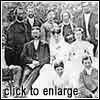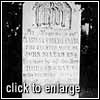|
| ||
|
John McLean
John McLean joined the Hudson's Bay Company in the winter of 1820-1821. For twelve years John served an apprenticeship at various posts of the company in the Ottawa valley. Later John explored Canada from Ungava Bay, Labrador to New Caledonia (now British Columbia). On March 1, 1841, he received his long-awaited promotion to the commissioned rank of Chief Trader and continued to manage the affairs of the Company in the Indian Country until his retirement on June 1, 1846.
In 1965, the Grand (Great) Falls were renamed in honor of Sir Winston Churchill. Churchill Falls is a cataract in Newfoundland, Canada, about 300 ft high on the Churchill River (formerly the Hamilton River) in W. Labrador. It is part of a series of rapids and cataracts located about 200 miles from the river's mouth. Immediately below Churchill Falls is McLean Canyon, 12 miles long. The cataract was a spectacular sight until most of the river water was diverted to drive the turbines of the Churchill Falls underground hydroelectric plant that was completed in the mid-1970's. Higher than the world famous Niagara Falls, the Churchill Falls became the largest single-site source of power along the Canadian eastern seaboard.
After John retired from the Hudson's Bay Company, he settled his family in Guelph, Ontario, then
Canada West. In the original Market Square area, very likely on Gordon St., John became a grocery store manager from approximately 1846-1850. He helped establish the Guelph Herald, a strong conservative newspaper and took great interest in church and public schools.
In 1852, Lord Elgin (James Bruce), the Governor General of Canada invited John to execute the duties of commissioner under the Indian Protection Act in relation to the Indian lands at Saugeen. John spoke four or five Indian dialects and was respected by the Indians.
On August 1, 1853 "John McLean, of the Town of Guelph, Esquire", was appointed Guelph's first "Collector of Her Majesty's Customs" by the Governor General (Lord Elgin) of British North America.
On April 23, 1855 John was asked to lay the cornerstone at the Norfolk Street Church in Guelph. Many believe John was honored, in part, for this occasion because his wife, Clarissa Eugenia Evans, whom he married in 1845, was the daughter of Rev. James Evans, Minister and Pastor in 1839 at this Methodist Church. Rev. Evans had been a Wesleyan Methodist missionary in North-west Canada where he invented the Cree syllabic characters by which the Cree Indians first learned to read.
In 1857 John moved his family to Elora, Ontario where he was employed as Clerk of the Division Court for approximately 25 years. In June of 1883, John relocated to Victoria, BC with his youngest daughter, Eugenia Sarah McLean O'Brian. He died in her home at 112 Pandora St. on March 8, 1890. John McLean was buried in Victoria, BC on Vancouver Island on March 11, 1890 at the Ross Bay Cemetery.
In The Early History of Elora, John McLean is desribed as never receiving "credit for what he did. The Canadian public did not know what part he played when, in 1869, at the time of the Alabama Award (Claims), politicians in London and Ottawa were going to give away all the land west of Lake Superior to the United States. The politicians and public generally, were deceived by the stories circulated by the Hudson's Bay Company that the North-west Territory, which they had occupied and wanted to keep, was a cold, Arctic region unfit for the homes of white men".
John's prolific writings to the newspapers, under the nom-de-plume "Viator" helped influence Parliament's decision to retain this land for Canada since he had first-hand knowledge of its vast resources, beauty and immense value. Needless to say, other options were prevailed upon to repay this debt to the U. S. and Canada remained intact.
On a personal note, John was described as having:
As a scholar he was accomplished. His acquaintance with the classics was more than superficial. He was well read in French and English and quite familiar with Gaelic. He also had a thorough knowledge of the principal Indian languages as spoken from one side of the continent to the other."
There is an historic plaque in Guelph, Ontario, Canada in John McLean's honor. It is located in front of his existing limestone house at 21 Nottingham Street, located near the city's University section. This plaque was erected by the Ontario Archeological and Historic Sites Board on June 22, 1957.
Click here for sources used in writing this article.
Special thanks to Dick and Evie McLean of West Seneca, New York, who researched and wrote this article. They also provided all the images from their private family collection. Dick just happens to be John McLean's great-grandson and is very proud of his famous Scottish ancestor! You can contact Dick or Evie by E-Mail at: Dick and Evie McLean
| ||
|
| ||
Thursday, December 26th, 2019
Attention visitors: Tartans.com is back. Please note that this is a snapshot of the site as it existed nearly 20 years ago and you may encounter broken links; we are still combing through the site and correcting those as we find them. Please also note that some sections are currently not functional, primarily the discussion forums/clan chat boards.
|
** HOME - First Time Visitors - Glossary - - Contact Us ** Awards | Bibliography | Clan Calendar | Clan Chat | Clan Finder | History | Famous Scots | Genealogy | Great Hall of the Clans | Links | News and Features | Scots on the Net | Search | Site Map The Gathering of the Clans
Copyright 1995- Tartans.com - All Rights Reserved. |




